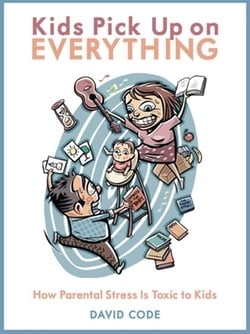
David Code has a message for today’s parents: Chill out.
We know, it’s not that easy. But that ball of stress you’re holding inside is actually rubbing off on your child, Code says in his new book, Kids Pick Up On Everything: How Parental Stress is Toxic to Kids. Turns out that children of parents with high-stress levels are more likely to develop a host of ailments, such as ADHD, anxiety, colic, asthma, allergies—the list goes on.
We spoke with Code, an Episcopal minister and marriage and family counselor, about his new book and his advice for reducing our—and apparently our children’s—stress levels.
What gave you the idea to write this book? Was it from personal experience?
(Laughs) There was definitely that. It was very frustrating working with families as a minister in the parish because often when couples came to me with marital problems, they already had one foot in the attorney’s door. Or when families had a crisis and I’d visit their homes, it just seemed it was almost too late to do anything. I thought, There must be a better way.
So I turned to PubMed and started to look through some of the different studies. As I was reading more and more, I thought, Man, people should know about this. We’re not even aware that kids really do pick up on everything. They absorb all the stress in the household.
Everyone knows that when one person is stressed out, it can affect anyone who is unfortunately around him or her. So what’s the real problem in this parent-child scenario?
Well, I think that many of us have a concept of the mind and body connection. And I would sum up my research by saying that there is very much a mind-body connection between a parent’s anxious mind and a child’s sensitive body.
The parent is broadcasting all kinds of communications and stress that he or she may not be aware of. But there’s this implied “psychic bond” between parent and child. When a baby is born, he or she is entirely dependent on the parents for survival, so it’s in the child’s best interest to have a good idea of what’s going on with Mom and Dad.
Kids pick up on verbal cues, nonverbal cues, every gesture, facial expression, and noise. It sets up a very intense communication pipeline, an emotional pipepline, which means that while stress is very contagious among people in general, it’s particularly contagious between a child and parent.
So what do you suggest parents do to avoid getting stressed and potentially affecting their children? It can’t be that easy, especially in a place like DC.
It’s not so much about canceling appointments—it’s about socializing. It’s about building up a community, getting back in touch with family and friends. These days, everyone agrees that our stress is increasing because we lead busier schedules or because of technology and such. Actually, both the busy schedule and technology are symptoms, not causes, of stress. The cause is actually increasing isolation.
Have you ever noticed that when you’re upset, you feel the need to go off and be alone? Then the phone rings and it’s your friend. By the end of that conversation, you’ve almost completely forgotten what had upset you. This just proves how by being social we can be so much happier.
If you’re looking for something more concrete, I would say that parents should exercise together. Make a date with your spouse to exercise every evening after dinner or when you put the kids to bed. Exercise is a great stress buster.

Okay, but it sounds like parents should almost ignore their child or children to avoid transferring any of their stress. Where’s the fine line?
You’re right, there’s a very fine line. I think we want to believe that the more attention you give your kids, the better they’ll turn out. It’s truer to say that the calmer you are around your child, the better they’ll turn out. Every effort we make in managing our stress and emotions pays off in richly in our children.
We as human beings have forgotten that we are social animals. We want to belong; we have a primal need for acceptance, just like babies, who want to know they are loved and that someone is paying attention to them. We ignore this at our peril.
These days, families move around a lot more, people split up, they visit parents less often. There used to be three generations under one roof. Now, we’re scattered. I think that basic building block of our species—the herd, a.k.a. the family—has dissolved a lot. I don’t think very many of us realize just what an impact this has had on our psyche.
When it comes to the children, parents are focused on quality alone time with their child so they’ll turn out well. The best thing for your child is to have the kids socializing with kids and adults socializing with other adults. That’s the way the human species has socialized for the past millennium; it’s only in the past 30 years that we’ve decided we’re much better off alone.
A lot of the studies you consulted have to do with the prenatal stress that can, and usually does, affect a newborn. Isn’t it kind of hard to avoid being stressed when you’re carrying a child around for nine months?
The goal here is not zero stress—that’s not realistic. The goal is manageable levels, like our species had a couple hundred years ago. But today’s stress is different. It’s one that comes largely from isolation. So, no, the ideal pregnancy is not when you’re in a soundproof studio for nine months with no bad vibes. It’s more about avoiding the stress and having a ton of fun and socializing.
Anything else you’d like to tell parents reading this?
I really think parents are living in denial. It’s like we almost don’t want to know. The reaction to my book’s message has been, “Oh, great, another thing to be stressed about.” Are you kidding me? Here is great preventive medicine—and yes, it may taste bad going down—but your children’s health and your own mind will benefit.
Code’s book is available for purchase at Amazon.com. For more information on the author and his book, visit his Web site.


















